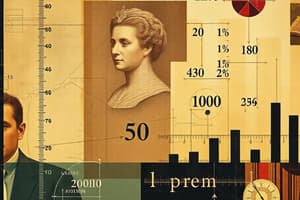Podcast
Questions and Answers
What is the volume of a rectangular prism with dimensions 2 cm, 4 cm, and 5 cm?
What is the volume of a rectangular prism with dimensions 2 cm, 4 cm, and 5 cm?
- 50 cm3
- 20 cm3
- 40 cm3 (correct)
- 30 cm3
How would you compute the mass of an object if the density is 6 g/cm3 and the volume is 40 cm3?
How would you compute the mass of an object if the density is 6 g/cm3 and the volume is 40 cm3?
- M = 6 + 40
- M = 6 - 40
- M = 6 x 40 (correct)
- M = 40 ÷ 6
If a force of 10 Newtons is applied to an area of 20 cm2, what pressure is produced?
If a force of 10 Newtons is applied to an area of 20 cm2, what pressure is produced?
- 0.2 N/cm2
- 2.0 N/cm2
- 0.5 N/cm2 (correct)
- 1.0 N/cm2
What is the result of converting 8 km/h into mph if 1 km = 1.6 miles?
What is the result of converting 8 km/h into mph if 1 km = 1.6 miles?
In the context of direct proportion, what does the equation y = kx represent?
In the context of direct proportion, what does the equation y = kx represent?
If the values d and t are directly proportional, what would the relationship be expressed as?
If the values d and t are directly proportional, what would the relationship be expressed as?
Which of the following is NOT a unit for measuring pressure?
Which of the following is NOT a unit for measuring pressure?
What characterizes a graph showing direct proportion between two variables?
What characterizes a graph showing direct proportion between two variables?
What is the decimal equivalent of increasing an amount by 12%?
What is the decimal equivalent of increasing an amount by 12%?
How much does the plane travel in 15 minutes if it moves at a speed of 2000 km/hour?
How much does the plane travel in 15 minutes if it moves at a speed of 2000 km/hour?
What is the overall percentage increase when an amount is increased first by 10% and then by 12%?
What is the overall percentage increase when an amount is increased first by 10% and then by 12%?
What is the density of a piece of metal with a mass of 40g and a volume of 4cm³?
What is the density of a piece of metal with a mass of 40g and a volume of 4cm³?
How do you calculate speed if given distance and time?
How do you calculate speed if given distance and time?
What is the total volume of a block of ice measuring 5cm by 2cm by 4cm?
What is the total volume of a block of ice measuring 5cm by 2cm by 4cm?
To convert 45 minutes into hours, how should it be expressed?
To convert 45 minutes into hours, how should it be expressed?
If a plane travels for 1 hour at a speed of 600 km/h, how far does it travel?
If a plane travels for 1 hour at a speed of 600 km/h, how far does it travel?
What is the equation for y in terms of x, given that y is directly proportional to $x^2$ and when $x = 2$, $y = 16$?
What is the equation for y in terms of x, given that y is directly proportional to $x^2$ and when $x = 2$, $y = 16$?
If g is proportional to the square root of f and when f = 9, g = 30, what is the equation for g in terms of f?
If g is proportional to the square root of f and when f = 9, g = 30, what is the equation for g in terms of f?
What is the value of k when y is inversely proportional to x and given that when $x = 4$, $y = 25$?
What is the value of k when y is inversely proportional to x and given that when $x = 4$, $y = 25$?
Given that y is inversely proportional to x, what is the solution for y when x is 2 and k is 100?
Given that y is inversely proportional to x, what is the solution for y when x is 2 and k is 100?
How would you express g in terms of f if g is proportional to the square root of f with k = 10?
How would you express g in terms of f if g is proportional to the square root of f with k = 10?
If y is directly proportional to $x^2$, which of the following statements is true?
If y is directly proportional to $x^2$, which of the following statements is true?
What happens to y when x is increased by 50% in an inverse relationship?
What happens to y when x is increased by 50% in an inverse relationship?
What does k represent in a proportional relationship?
What does k represent in a proportional relationship?
Flashcards
Pressure
Pressure
A measure of the force applied per unit area.
Direct Proportion
Direct Proportion
Direct Proportion occurs when two quantities have a constant ratio. As one quantity increases, the other increases proportionally.
y = kx
y = kx
The formula that connects two quantities in direct proportion. 'k' is the constant of proportionality.
Constant of Proportionality (k)
Constant of Proportionality (k)
Signup and view all the flashcards
Percentage Multiplier
Percentage Multiplier
Signup and view all the flashcards
Compound Measure
Compound Measure
Signup and view all the flashcards
Speed
Speed
Signup and view all the flashcards
Density
Density
Signup and view all the flashcards
Overall Percentage Increase
Overall Percentage Increase
Signup and view all the flashcards
Compound Interest
Compound Interest
Signup and view all the flashcards
Distance Calculation
Distance Calculation
Signup and view all the flashcards
Distance, Speed, Time Problems
Distance, Speed, Time Problems
Signup and view all the flashcards
Inverse Proportion
Inverse Proportion
Signup and view all the flashcards
Constant of Proportionality in Inverse Proportion (k)
Constant of Proportionality in Inverse Proportion (k)
Signup and view all the flashcards
Direct Proportion with Powers
Direct Proportion with Powers
Signup and view all the flashcards
Study Notes
Repeated Percentages
- To increase an amount by 10%, multiply it by 1.10
- To increase an amount by 12%, multiply it by 1.12
- To find the overall percentage increase when increasing by multiple percentages, multiply the individual multipliers
- For example, a 10% increase, then a 12% increase results in a 123.2% overall increase
Compound Percentages
- Compound interest calculates interest on the initial amount plus any accumulated interest.
- Compound depreciation calculates depreciation on the initial amount plus any accumulated depreciation.
- To calculate compound interest or depreciation, multiply the initial amount by the multiplier raised to the power of the number of years.
- For example, if a £50,000 house increases by 10% each year for three years, it will be worth £66,550
Compound Measures - Definitions
- Density: The amount of mass in a volume. Indicates how tightly matter is packed. Measured in g/cm³, kg/m³ or kg/l.
- Speed: The rate of change in distance over time. Measured in m/s, km/h, or mph.
- Pressure: Force applied per unit area. Measured in N/m² or N/cm².
- Fuel consumption: The distance a vehicle travels per unit of fuel volume. Measured in km/l or mpg.
Compound Measures - Formulas
- Speed: Speed = Distance ÷ Time, Time = Distance ÷ Speed, Distance = Speed x Time
- Density: Density = Mass ÷ Volume, Volume = Mass ÷ Density, Mass = Density x Volume
- Pressure: Force = Pressure x Area, Pressure = Force ÷ Area, Area = Force ÷ Pressure
Compound Measures - Converting Measurements
- Units of measurement can be converted using conversion factors. Various conversion examples are provided, such as converting km/h to mph or km/h to km/s, and mph to m/s
Direct Proportion
- Two sets of values have a direct proportion if they have a common multiplier.
- The graph of a direct proportion is a straight line that passes through the origin.
Direct Proportion - Formulas without powers
- If y is directly proportional to x, then y = kx, where k is the constant of proportionality.
- To find the formula for a directly proportional relationship between two variables, find the common multiplier by dividing corresponding pairs of values.
- For example, if x = 6 and y = 18 and they are directly proportional then the equation is y = 3x
Direct Proportion - Formulas with powers
- If y is directly proportional to x³, then y = kx³.
- If y is directly proportional to x², then y = kx².
- Find the constant of proportionality by plugging corresponding values of x and y into the equation.
Inverse Proportion
- Two sets of values have an inverse proportion if one value increases and the other decreases.
- If y is inversely proportional to x, then y = k/x, where k is the constant of proportionality.
- To find the constant of proportionality for an inversely proportional relationship, multiply corresponding values of x and y. e.g y = 100/x if x = 4, y = 25 then 100 = 4 * 25.
Studying That Suits You
Use AI to generate personalized quizzes and flashcards to suit your learning preferences.




